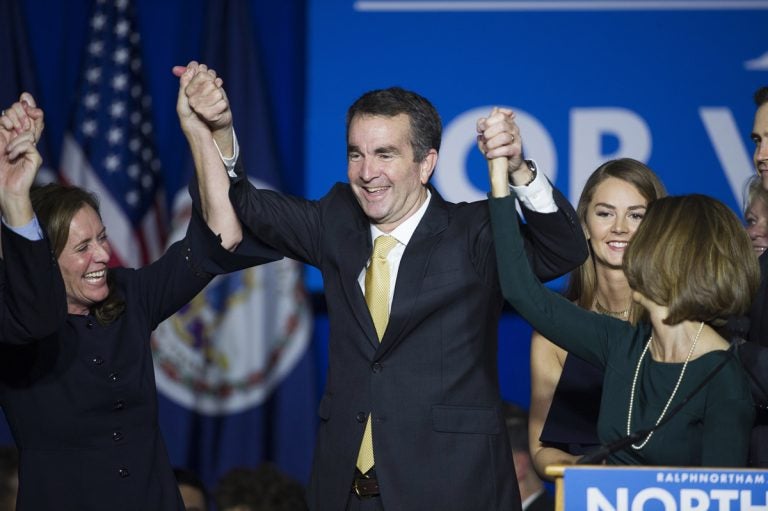Trumpism gets trounced in Virginia’s blue wave
To fully understand what happened last night in Virginia, to best gauge the titanic blue wave that trounced Trumpism and gave us hope, we need only look at the numbers.

Virginia Gov.-elect Ralph Northam celebrates his election victory with his wife Pam and daughter Aubrey, right, and Dorothy McAuliffe, wife of Virginia Gov. Terry McAuliffe at the Northam For Governor election night party at George Mason University in Fairfax, Va., Tuesday, Nov. 7, 2017. (Cliff Owen/AP Photo)
To fully understand what happened last night in the battleground state of Virginia, to best gauge the titanic blue wave that trounced Trumpism and gave us hope for this country, we need only look at the numbers.
In Democrat Ralph Northam’s unforeseen nine-point gubernatorial victory over Trump mini-me Ed Gillespie, the turnout was roughly 500,000 votes greater than in the previous gubernatorial election — and nearly 80 percent of those 500,000 people voted for Northam. The exit polls reported that 57 percent of Virginia’s Tuesday voters think Trump is a bad president; 87 percent of them flocked to Northam. Roughly half of Tuesday’s voters said they wanted to send a message to Trump, in support or opposition; by more than a 2-1 margin, thumbs-down voters outnumbered the Trumpkins.
Gillespie essentially chose to put Trump on the ballot. Or perhaps he felt he had no choice. Either way, Trump lost big.
And if you’re not into numbers, here’s Virginia Republican congressman Scott Taylor: “I don’t know how you get around that this wasn’t a referendum on the administration, I just don’t. Some of the very divisive rhetoric really prompted and helped usher in a really high Democratic turnout in Virginia.”
True that. Democrats in their dreams didn’t expect the blue wave to be so high, and how sweet it was.
Voters resoundingly said no to Gillespie’s tawdry Trump mimicry — his attempts to smear undocumented immigrants as violent gang members, to insinuate that Northam supported violent gangs, to paint Northam as a pal of child sex abusers, to splash in the Trump swamp in all kinds of ways not worth repeating. And voters resoundingly said no to Trump’s tweeted claims that Gillespie would solve the state’s “high crime” (another lie; Virginia has one of the lowest violent crime rates in the country), and it’s “terrible” economy (another lie; Virginia’s jobless rate is 3.7 percent).
Just as notably, the blue backlash was so intense that it swept away Republicans in a slew of down-ballot races. The GOP has dominated the state House (known as the House of Delegates) by a nearly 2-1 margin, 66 seats to 34 — but last night, that margin was wiped out. It’s possible, pending some recounts, that Republicans could even lose control of the chamber. In Congressman Taylor’s words of alarm, “I’m telling you that from someone who is from Virginia, who watched these races, (I) watched people lose tonight against opponents who are completely no-name.”
In some cases, those “no-name” victories were enormously symbolic. A transgender Democrat ousted a socially conservative 13-term Republican incumbent who’d sponsored a bathroom bill. While declaring victory, Danica Roem said, “To every person who has ever been singled out, who has ever been stigmatized, who has ever been the misfit, who’s ever been the kid in the corner, who’s ever needed someone to stand up for them when they didn’t have a voice of their own because there is no one else with them, this (win) is for you.”
Elsewhere, in a heavily rural district, a Democratic gun reform activist — the boyfriend of a local broadcaster who was gunned down on live TV — ousted a Republican incumbent. And still elsewhere, two Latinas ousted Republican incumbents; they’ll be the first Hispanic women ever to serve in the House of Delegates.
There’s an old saying that a rising tide lifts all boats, and that’s clearly what happened to the Democratic underticket — including the next lieutenant governor, who ran separately on the Virginia ballot. Justin Fairfax became the first African-American to win a statewide race since 1989.
All told, these results will likely sharpen congressional Republican concerns about the 2018 midterm elections. Incumbents in the scarlet red districts have little reason to fret, but anyone in a remotely competitive district has to wonder whether it’s smart or suicidal to run with Trumpism.
Trump, of course, is full of bad advice. Last night, after it quickly became apparent that Gillespie was sinking beneath the wave, Trump went on Twitter to throw Gillespie under the bus. (Because nothing is ever his fault.) Trump’s spin was that Gillespie lost because he was insufficiently Trumpian, because he “did not embrace me or what I stand for.”
Yeah, that’s brilliant. I’m sure the robust Democratic turnout would have plummeted if Gillespie had removed all guardrails and doubled down on demagoguery.
Former Republican congressman Tom Davis, a one-time GOP House leader, a Virginian who knows more about politics than Trump will ever learn, said it best last night: “(Gillespie) couldn’t escape being a proxy for Trump, which killed him. It’s a huge drag on the ticket. It motivated the Democratic base. Democrats came out en masse in protest. This was their first chance to mobilize the base. The lesson here is that Republicans have to get their act together.”
But how? With the blue wave sweeping not just across Virginia last night but also New Jersey (last vestiges of Chris Christie — gone), Washington State (the senate flipped from red to blue), New Hampshire, Maine, Pennsylvania’s Delaware County (where local control is — was — traditionally Republican), and Long Island (same as Delaware County), Republicans in all remotely competitive races may well be stuck on the stump with the stink of Trump.
WHYY is your source for fact-based, in-depth journalism and information. As a nonprofit organization, we rely on financial support from readers like you. Please give today.




